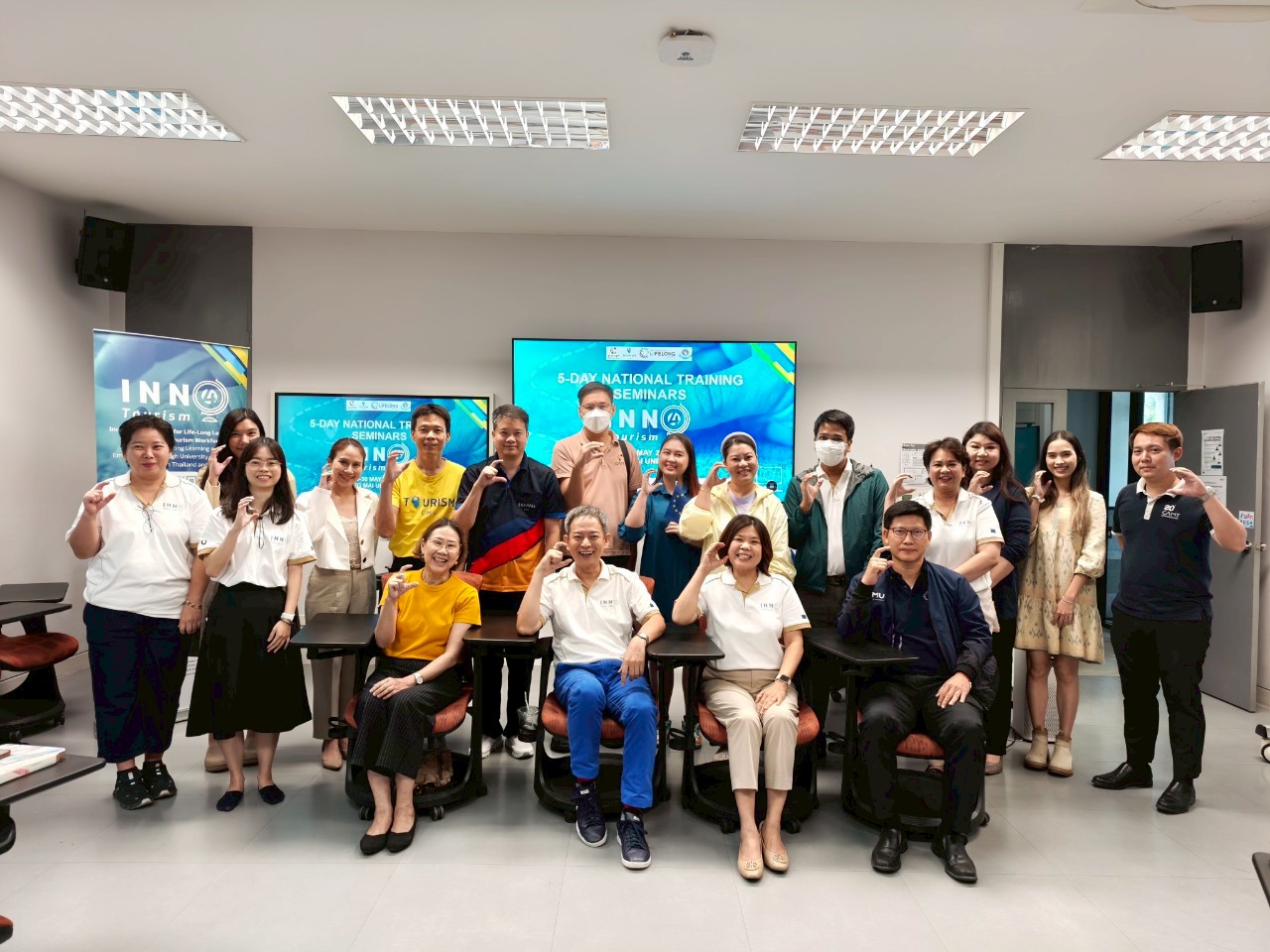The CMU 5-Day National Training Seminar
The CMU 5-Day National Training Seminar was held from 26-30 May 2025 at Room ILC-C301, 3rd Floor, Building C, Innovation and Learning Center, Chiang Mai University (CMU). There were more 20 participants from relevant faculties within the university joined the training. This seminar was organized through the collaboration of the College of Arts, Media, and Technology, Chiang Mai University, the Department of Tourism, Faculty of Humanities, and the CMU School of Lifelong Education. The objective of this seminar was to transfer knowledge on curriculum development for sustainable tourism, as part of the Training of Trainers (ToT) Programme under the INNO4Tourism Project. It aimed to enable HEIs staff who attended the training to effectively improve the teaching and learning medthedology, apply, and transfer the acquired knowledge within their own curriculum development in related fields. The training seminar covered a broad range of topics, including sustainable tourism skills, entrepreneurship, tourism management, digital skills, green skills, and soft skills, which are essential for developing the workforce of the modern era.
Throughout the 5-day training program, the following activities were organized:
Day 1: “Problem-Based Project and Tourism Literacy for Sustainable Tourism Development” was held. The session was conducted by Assistant Professor Dr. Yuthasak Chatkaewnapanon, member of the INNO4Tourism, Head of the Department
of Tourism, Faculty of Humanities. It focused on presenting fundamental frameworks in tourism for curriculum development aligned with learner skills and needs, and on developing a strategic perspective for sustainable tourism advancement.
Day 2: “Community-Based Learning (CBL)”, led by Assistant Professor Dr. Pattaraporn Khuwuthyakorn, CMU team member of the INNO4Tourism Project and lecturer from the College of Arts, Media and Technology. The session presented approaches to
integrate education with community engagement, encouraging learners to actively engage with real communities to better understand local problems, environments, cultures, and community needs. It emphasized fostering academic and necessary
skills along with social responsibility. The case study “Kheaw Chom Mueang” involved a tram tour exploring historical sites in Chiang Mai’s old city, in collaboration with the non-profit organization “Chiang Mai Network” with concept “Greenery – Beauty –
Scent” which is carried out by local people in Chiang Mai.
Day 3: “Development on New Curricular based on the UBC Approach and Minimizing Courses Redundancy though the Application Intelligence Tools”, led by Assistant Professor Dr. Orawit Thinnukool, INNO4Tourism Project leader of CMU team. The contents focused on analyzing the workforce market needs to develop modern curricula aligned with the University-Business Cooperation Mechanism (UBC Mechanism), leveraging data analytics and modern tools to ensure relevance to industry demands. It also covered the use of AI tools to reduce course content redundancy. During the training sessions also provided a platform for academic staff to share and exchange experiences on curriculum development.
Day 4: “Knowledge-Centric Learning Environment-Based”, led by Assistant Professor Dr. Achara Khamaksorn, CMU team member of the INNO4Tourism Project and lecturer from the College of Arts, Media and Technology. This session focused on designing learning environments that encourage knowledge sharing and creation in the context of tourism. The instructor took on the role of a facilitator, emphasizing the importance of the design of learning processes over direct content delivery.
Participants engaged in a hands-on workshop using the KLE Canvas tool to collaboratively design effective learning environments.
Day 5: “Workshop: Fostering Collaborative Mindset towards Sustainable Development Goals with the SDGs 2030 Game”, led by Associate Professor Dr. Prathana Jaiphong, CMU team member of the INNO4Tourism Project. The final day featured the SDGs 2030 board game, a simulation game designed to help participants understand the “Sustainability” and 17 Sustainable Development Goals (SDGs) set by the United Nations. Through this simulated environment, participants experienced
and realize the importance of collaboration and balanced resource management, particularly as they relate to sustainable tourism, digital skills, green skills, and the soft skills for the modern workforce. Over the 5-day seminar, participants gained valuable insight and opportunities to learn from experts, exchange experiences with networks both inside and outside the university, and engage in hands-on activities combining theory and practice. They also developed new ideas and skills applicable to their teaching. In addition, participants explored approaches to improving course content to better meet current needs, while gaining inspiration to further advance knowledge in a systematic way.
For updates and more information:
Website: http://inno4tourism.eu
Facebook page: https://www.facebook.com/inno4tourism
LinkedIn: https://www.linkedin.com/showcase/inno4tourism/

